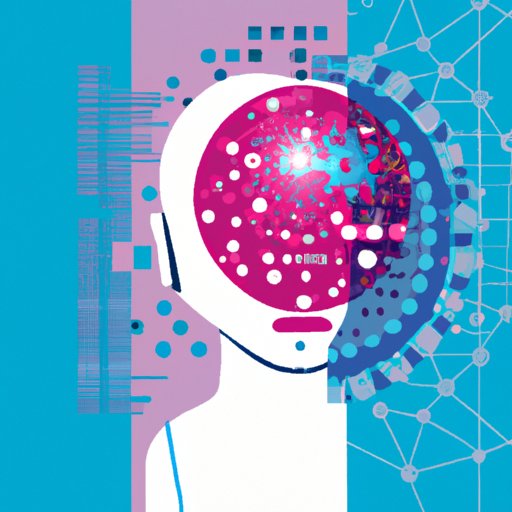Introduction
Artificial intelligence (AI) has been a popular topic in recent years, with many speculating about the possibilities of robots and machines replacing humans in various roles. But what exactly is AI? In short, AI is a form of computer technology that allows machines and computers to mimic human behavior and problem-solving skills. This technology has been used in a variety of fields, from healthcare to finance, and its capabilities are rapidly expanding. As AI continues to evolve, one of the most pressing questions is: Can AI replace human intelligence?

Exploring the Pros and Cons of AI Replacing Human Intelligence
When discussing the possibility of AI replacing human intelligence, it’s important to consider both the advantages and disadvantages. On the one hand, AI has the potential to offer numerous benefits. For example, AI systems can process data faster than humans, meaning they can make decisions quicker and more accurately. AI also eliminates the need for manual labor, which can reduce costs and increase efficiency. Additionally, AI systems can be programmed to learn and adapt, allowing them to improve their algorithms over time.
On the other hand, there are some drawbacks to relying on AI. For starters, AI systems can be expensive to develop and maintain, so they may not always be cost-effective. Additionally, AI systems are only as good as the data they are given, so if the data is inaccurate or incomplete, the results will be unreliable. Finally, AI systems can lack the creativity and intuition that humans possess, making them less capable of dealing with complex tasks and problems.
Examining How AI Could Impact Human Employment
One of the most discussed topics when it comes to AI replacing human intelligence is the potential for job loss due to automation. While it’s true that automation has already eliminated some jobs, research suggests that this trend is likely to continue. According to a study by McKinsey Global Institute, “as many as 375 million workers—or roughly 14 percent of the global workforce—may need to switch occupational categories by 2030 due to advancements in automation.”
However, while automation will lead to job losses, it’s important to remember that it could also create new opportunities. AI systems can free up employees to focus on higher-level tasks, such as problem-solving and critical thinking. Additionally, AI could create new job roles, such as data analysts and AI engineers, which would require specialized training and expertise. Ultimately, the impact of AI on employment depends on how companies choose to use it.
Discussing the Ethical Implications of AI
Another important factor to consider when discussing AI replacing human intelligence is the ethical implications of using this technology. One of the biggest concerns is data privacy; AI systems have access to vast amounts of personal information, and if this data is not adequately protected, it could put individuals at risk. Additionally, AI systems are susceptible to bias, as they are often trained on datasets that reflect existing social inequalities. This could lead to discriminatory outcomes, such as AI systems being used to deny people access to services or jobs.

Comparing AI to Human Intelligence
It’s clear that AI systems have the potential to be powerful tools, but it’s important to remember that they cannot completely replace human intelligence. Humans have certain advantages that AI systems do not, such as the ability to think creatively and intuitively. Additionally, humans are capable of understanding and interpreting context, which AI systems currently cannot do. While AI systems may eventually be able to replicate these abilities, it’s unlikely that they will ever be able to fully replace humans.

Investigating the Future of AI
As AI continues to evolve, it’s becoming increasingly clear that it will have a major impact on society. AI could potentially change the way we interact with technology, as well as the way we work and live. AI could also lead to advances in healthcare, transportation, and other areas, as well as provide new opportunities for economic growth. However, it’s important to remember that these changes will not happen overnight; it will take time for AI to reach its full potential.
Discussing AI’s Capability to Learn and Adapt
One of the most exciting aspects of AI is its ability to learn and adapt. By giving AI systems access to large amounts of data, they can develop algorithms that allow them to recognize patterns and make predictions. AI systems can also be taught to respond to new situations, making them better suited for complex tasks. However, teaching AI systems can be difficult, as it requires a deep understanding of the technology and its capabilities.
Examining the Role of Humans in an AI-Driven World
Ultimately, no matter how advanced AI becomes, humans will still play an important role in an AI-driven world. Even though AI systems can process data faster and more efficiently than humans, they cannot replace human oversight. Humans will still be needed to monitor and manage AI systems, ensuring that they are being used ethically and responsibly. Additionally, humans will need to be prepared for the changes that AI will bring, such as the potential for job loss and the need for new skills.
Conclusion
In conclusion, the question of whether AI can replace human intelligence is a complex one. While AI systems can offer numerous benefits, such as increased efficiency and accuracy, they cannot completely replace humans. Additionally, AI has the potential to cause job losses and raise ethical concerns, so it’s important to approach it carefully. Ultimately, AI is a powerful tool, but it should not be seen as a replacement for human intelligence.
(Note: Is this article not meeting your expectations? Do you have knowledge or insights to share? Unlock new opportunities and expand your reach by joining our authors team. Click Registration to join us and share your expertise with our readers.)
